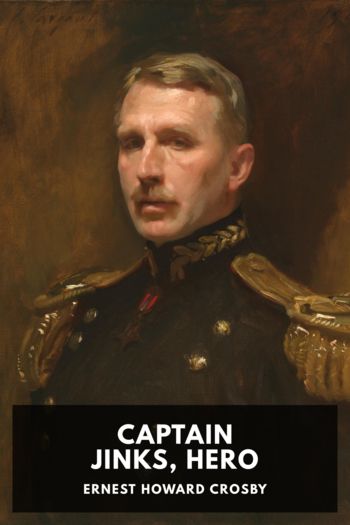Captain Jinks, Hero, Ernest Howard Crosby [free e books to read TXT] 📗

- Author: Ernest Howard Crosby
Book online «Captain Jinks, Hero, Ernest Howard Crosby [free e books to read TXT] 📗». Author Ernest Howard Crosby
“Here’s my friend, Captain Jinks,” said a husky voice which Sam recognized as that of old Reddy. “Here, take this chair near the fire.”
Sam accepted the offered chair, although he would have preferred a situation a little less torrid.
“Gentlemen, this is Captain Jinks,” said the old man, determined to get all the credit he could from his acquaintance with Sam. “Captain, this is my friend, Mr. Jackson.”
Mr. Jackson was a tall, thin, narrow-chested man with no shoulders, a rounded back, and a gray, tobacco-stained mustache. His face was covered with pimples, and a huge quid of tobacco was concealed under his cheek. He was sitting on a chair tipped back rather beyond the danger-point, and his feet rested on the rim which projected from the stove halfway up. He made no effort to rise, but slowly extended a grimy, clammy hand which Sam pressed with some hesitation.
“Glad to make your acquaintance, Captain,” he drawled in a half-cracked voice that suggested damaged lungs and vocal organs. “Shake hands with Mr. Tucker.”
Mr. Tucker, a little, old, red-faced man on the other side of the stove, advanced and went through the ceremony suggested.
“We were just a-talking about them Cubapinos,” explained Reddy. “The idee of them fellers a-pitching into us after all we’ve done for ’em. It’s outrageous. They’re only monkeys anyway, and they ought to be shot, every mother’s son on ’em. Haven’t we freed ’em from the cruel Castalians that they’ve been hating so for three hundred years?”
“They seem to be hating us pretty well just now,” said a man in the corner, whose voice sounded familiar to Sam. He turned and recognized the commercial traveler of the day before.
“They’re welcome to hate us,” answered Jackson, “and when it comes to a matter of hating I shouldn’t think much of us if we couldn’t make ’em hate us as much in a year as the Castalians could in three hundred. They’re a blamed slow lot and we ain’t. That’s all there is of it. What do you think, Captain?”
“I fear,” said Sam, “that they don’t quite understand the great blessings we’re conferring on them.”
“What blessings?” asked the drummer.
“Why,” said Sam, “liberty and independence—no, I don’t mean independence exactly, but liberty and freedom.”
“Then why don’t we leave them alone instead of fighting them?”
“What an idee!” exclaimed Tucker. “They don’t know what liberty is, and we must teach ’em if we have to blow their brains out.”
“You’re too hard on ’em, Tucker,” drawled Mr. Jackson. “We mustn’t expect too much from pore savages who live in a country so hot that they can’t progress like we do.” Here Mr. Jackson took off his hat and wiped the beads of perspiration from his brow with a red bandanna handkerchief. “Don’t expect too much from cannibals that have their brains half roasted by the tropical sun.”
“That’s a fact!” said someone in the throng.
“Yes,” said Jackson, crossing his legs on a level well above his head, “them pore critters need our civilization, that’s what they need,” and he dexterously squirted a mouthful of tobacco juice on the white-hot stove, where it sizzled and gradually evaporated. “We must make real men of ’em. We must give ’em our strength and vigor and intelligence. They’re a dirty lot of lazy beggars, that’s the long and short of it, and we must turn ’em into gentlemen like us!”
A general murmur of approval followed this outburst.
“I hear,” said Sam, anxious to get some definite information as to the warriors of the town, “I hear that several Slowburghers are going to the war.”
“Yes,” said Tucker, while Jackson after his effort settled down into a semi-comatose state, “six of our boys are a-going. There’s Davy Black, he drives the fastest horse in these parts, and Tom Slade. Where is Tom? He’s generally here. They’ll miss him here at the hotel, and Jim Thomson who used to be bartender over at Bloodgood’s, and the two Thatchers—they’re cousins—that makes five.”
“The village ought to be glad they are going to represent her at the front,” said Sam.
“From all I can hear,” said the commercial man, “I think they are.”
“Naturally,” cried Sam, “it will reflect great glory on the place. You ought to be proud of them.”
“It’ll help the insurance business here,” said a young man who had not yet spoken.
“How is that?” asked Sam. “I don’t exactly see.”
“Well, it’s this way. You see I’m in the insurance business and I can’t write a policy on a barn in this township, there’s been so many burned; and while I don’t want to say nothing against anybody, we think maybe they won’t burn so much when the Thatchers clear out.”
“Nothin’ ain’t ever been proved against ’em,” said Tucker.
“That’s true,” said the young man, “but perhaps there might have been if they’d stayed. They say that Squire Jones was going to have Josh Thatcher arrested next week for his barn, but he’s agreed to let





Comments (0)